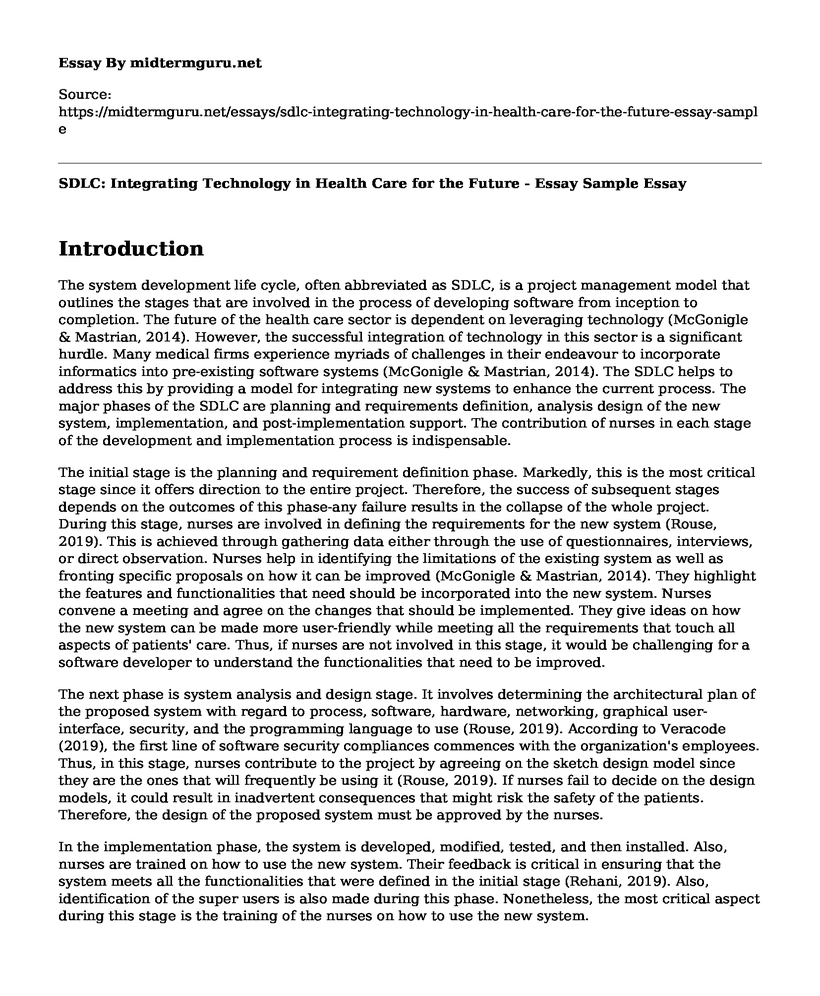Introduction
The system development life cycle, often abbreviated as SDLC, is a project management model that outlines the stages that are involved in the process of developing software from inception to completion. The future of the health care sector is dependent on leveraging technology (McGonigle & Mastrian, 2014). However, the successful integration of technology in this sector is a significant hurdle. Many medical firms experience myriads of challenges in their endeavour to incorporate informatics into pre-existing software systems (McGonigle & Mastrian, 2014). The SDLC helps to address this by providing a model for integrating new systems to enhance the current process. The major phases of the SDLC are planning and requirements definition, analysis design of the new system, implementation, and post-implementation support. The contribution of nurses in each stage of the development and implementation process is indispensable.
The initial stage is the planning and requirement definition phase. Markedly, this is the most critical stage since it offers direction to the entire project. Therefore, the success of subsequent stages depends on the outcomes of this phase-any failure results in the collapse of the whole project. During this stage, nurses are involved in defining the requirements for the new system (Rouse, 2019). This is achieved through gathering data either through the use of questionnaires, interviews, or direct observation. Nurses help in identifying the limitations of the existing system as well as fronting specific proposals on how it can be improved (McGonigle & Mastrian, 2014). They highlight the features and functionalities that need should be incorporated into the new system. Nurses convene a meeting and agree on the changes that should be implemented. They give ideas on how the new system can be made more user-friendly while meeting all the requirements that touch all aspects of patients' care. Thus, if nurses are not involved in this stage, it would be challenging for a software developer to understand the functionalities that need to be improved.
The next phase is system analysis and design stage. It involves determining the architectural plan of the proposed system with regard to process, software, hardware, networking, graphical user-interface, security, and the programming language to use (Rouse, 2019). According to Veracode (2019), the first line of software security compliances commences with the organization's employees. Thus, in this stage, nurses contribute to the project by agreeing on the sketch design model since they are the ones that will frequently be using it (Rouse, 2019). If nurses fail to decide on the design models, it could result in inadvertent consequences that might risk the safety of the patients. Therefore, the design of the proposed system must be approved by the nurses.
In the implementation phase, the system is developed, modified, tested, and then installed. Also, nurses are trained on how to use the new system. Their feedback is critical in ensuring that the system meets all the functionalities that were defined in the initial stage (Rehani, 2019). Also, identification of the super users is also made during this phase. Nonetheless, the most critical aspect during this stage is the training of the nurses on how to use the new system.
The last phase of the SDLC entails post-implementation support. Essentially, this involves the maintenance of the software system (Rouse, 2019). After the system has been implemented, nurses may identify new needs that might be incorporated into the system. Consequently, this calls for corrective, adaptive, preventive, or perfective maintenance (Rouse, 2019). Thus, nurses should be kept updated about any modification that is made in the system.
Conclusion
In conclusion, this discussion has described the role that nurses play in the SDLC. As underscored, during the planning and requirement definition, nurses should be involved in defining the functionalities of the new system. Notably, it includes getting their views on the limitations of the current system. In the design phases, nurses should be involved in designing the sketch models of the systems since they are the primary users of the system. During the implementation stage, nurses should be called upon to verify whether the developed system meets all the requirements initially defined. They should also be trained on how to use the new system. Finally, in the post-implementation stage, nurses should be kept updated about any changes done in the system.
References
McGonigle, D., & Mastrian, K. G. (Eds.). (2014). Nursing informatics and the foundation of knowledge. Jones & Bartlett Publishers. https://doi.org/10.1016/j.aorn.2014.06.012
Rehani, N. (2019). Using SDLC Methodology to Implement HIT. Retrieved from https://pdfs.semanticscholar.org/7fbd/35017b7085209694cd56373e8eab62b84b2a.pdf
Rouse, M. (2019). Systems Development Life Cycle (SDLC). Retrieved from https://searchsoftwarequality.techtarget.com/definition/systems-development-life-cycleVeracode (2019). What is Systems Development Life Cycle? Retrieved from https://www.veracode.com/security/what-systems-development-life-cycle
Cite this page
SDLC: Integrating Technology in Health Care for the Future - Essay Sample. (2023, Jan 31). Retrieved from https://midtermguru.com/essays/sdlc-integrating-technology-in-health-care-for-the-future-essay-sample
If you are the original author of this essay and no longer wish to have it published on the midtermguru.com website, please click below to request its removal:
- Paper Sample on Noise Based Modulation Techniques
- Leadership in Nursing: Presentation
- Elderly Heart Failure - Essay Sample
- HIV Prevention Plan Targeted to African American Urban Culture - Essay Sample
- Article Analysis Essay on Discussing Death, Dying, and End-Of-Life Goals of Care
- Nursing Student Striving to Solve Health Problems With Innovations - Essay Sample
- Nursing Research: Key to Professional Success & Patient Care - Essay Sample







